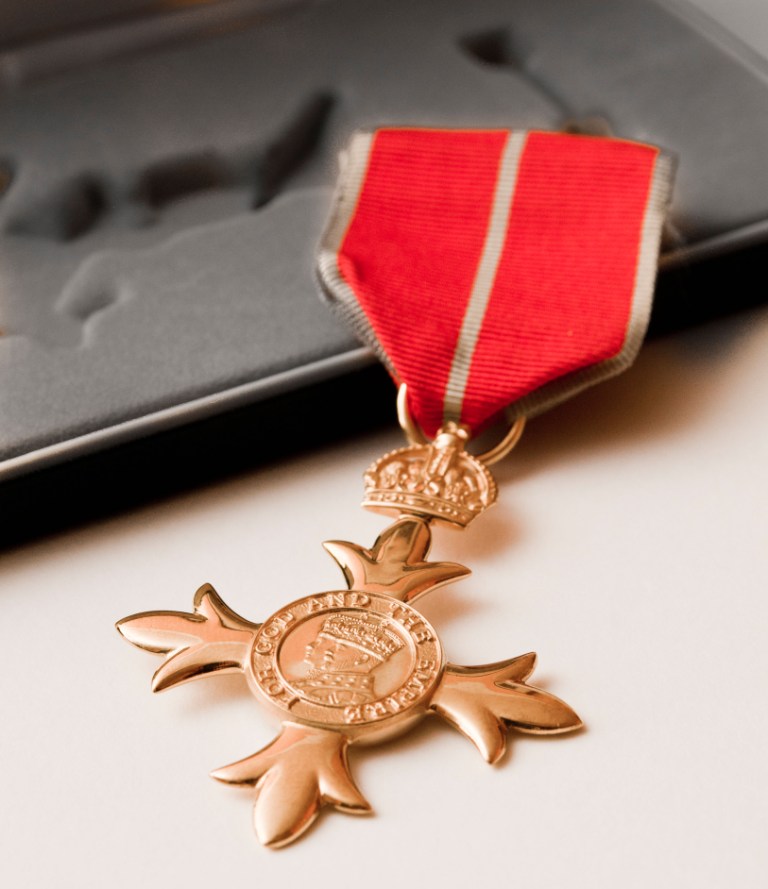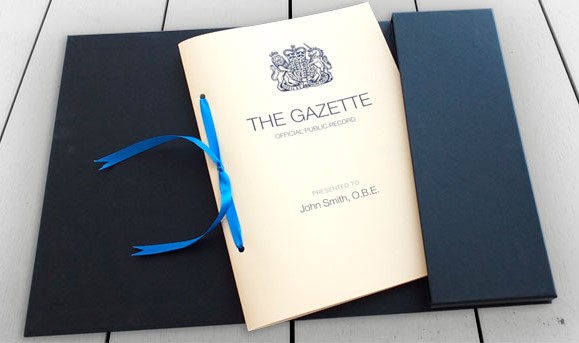Everything you need to know about nominating someone for a UK honour
Queen's honours recipients are announced twice a year in The Gazette. But how do you nominate someone for an MBE, CBE, OBE or other honour in the British honours system?

Who can be nominated for a UK honour?
Any British national or citizen of the 15 Commonwealth realms can be nominated for honours in the British honours system. This ensures that people who aren't in the public eye are recognised for service and contribution to their respective fields.
The honours system recognises individual achievements in fields including:
- community, voluntary and local services
- arts and media
- sport
- science and technology
- health
- education
- business and the economy
- civil or political service
To receive an honour, an individual must still be actively involved in what they've been nominated for. The only honours which can be awarded after someone's death are bravery awards.
Only individuals can be nominated for honours. However, volunteer groups can be nominated for the Queen's Award for Voluntary Service.
As well as being able to nominate someone in the UK, you can also nominate someone for an honour if they live or work abroad and they've made achievements in either the UK and their achievement has a significant international element, or another country. However, if they're not a British citizen, they'll be given an 'honorary award'.
Why nominate someone for a British honour?
There are various reasons why someone may be recognised in the honours system, including:
- making a difference to their community or field of work
- enhancing Britain's reputation
- long-term voluntary service
- innovation and entrepreneurship
- changing things, with an emphasis on achievement
- improving life for people less able to help themselves
- displaying moral courage
How can I nominate someone for an honour in the UK?
Anybody in the UK can make a recommendation for a British national to receive an honour and there are three ways to make a nomination:
- online
- by post
- by email
Once you've nominated someone for an award, you'll receive an acknowledgment. However, it should be noted that you may not hear anything else for 12 to 18 months.
How to nominate someone for a UK honour online
For many, the most convenient way of nominating someone for an honour in the UK is to complete an online form on Gov.uk.
To nominate online, you'll need to write a detailed description explaining why you're nominating an individual, as well as provide:
- your nominee's name, age, address and contact details
- details of relevant work or volunteering they've done
- details of any awards or other recognition they've received
- two supporting letters to back up your nomination - these should be from people who know the nominee personally
How to nominate someone for a UK honour by post or email
You can also make a nomination by post or email. Once an honours nomination form has been filled in, it can then be sent to:
Honours and Appointments Secretariat
Cabinet Office
Room G39
1 Horse Guards Road
London
SW1A 2HQ
Alternatively, the form can be sent to honours@cabinetoffice.gov.uk.
How to nominate someone for a UK honour who lives or works abroad
If you wish to nominate someone who lives or works abroad, a nomination form will need to be filled in and sent to:
Royal, Ceremonial and Honours Unit
Protocol Directorate
Foreign and Commonwealth Office
King Charles St
London
SW1A 2AH
Who decides which nominees receive a British honour?
Whether someone gets an honour is decided by the honours committee. Honours committees are made up of both senior civil servants and people who are independent of government. Each honours committee has an independent chairperson.
The committee's recommendations go to the Prime Minister and then to the Queen, who awards the honour. All nominees are checked by various government departments to make sure they're suitable for an honour and this may include checks by HM Revenue and Customs (HMRC).
Once all recipients have been decided and checks have been completed, the Central Chancery of the Orders of Knighthood at St James's Palace then arranges investitures for the recipients to be presented with their medals by the Queen or other members of the Royal Family.
The lists of who's received honours are published twice a year in The Gazette, at new year and in June on the date of the Queen's official birthday.
What honours can someone be nominated for?
While you can nominate any individual for a British honour, you cannot nominate them for a specific honour. Which honour a recipient receives is decided by the honours committee.
The honours which can be awarded to nominees include:
- Companion of Honour
The Companion of Honour is an honour given to individuals who have made a significant contribution to the arts, science, medicine or the government over a long period of time. It is limited to just 65 people at any one time.
- Knight or Dame
The two senior ranks of the Order of the British Empire are Knight or Dame Grand Cross, and Knight or Dame Commander. The honours are awarded to members who have made major contributions to any activity, usually at national level.
- CBE
The Commander of the Order of the British Empire (CBE) is the highest-ranking Order of the British Empire honour (excluding a knighthood/damehood) and is awarded to individuals who have a prominent role at national level, or a leading role at regional level, for distinguished and innovative contribution in any area.
- OBE
The Officer of the Order of the British Empire (OBE) is awarded to individuals who have made major contributions at a local level, or whose work has gained a national profile.
- MBE
The Member of the Order of the British Empire (MBE) is awarded for an outstanding achievement or service to the community which has had a long-term, significant impact.
- British Empire Medal (BEM)
The BEM is awarded for a 'hands-on' service to the local community. This could be a long-term charitable or voluntary activity, or innovative work of a relatively short duration (3 to 4 years) that has made a significant difference.
- Royal Victorian Order (RVO)
The RVO is an award given by the Queen - usually to people who have helped her personally, such as members of the Royal household staff or British ambassadors.
Celebrate your honour with a commemorative edition
If you or a loved one have been honoured by the Queen or mentioned in despatches, The Gazette is available to buy as a personalised commemorative edition. Each pack contains a complete edition of The Gazette from the day the honour was published.
See also
What is the difference between a CBE, OBE, MBE and a knighthood?
The Order of the British Empire (part one): 1917 to 1922
The Queen's Birthday honours 2019
Find out more
Nominate someone for an honour or award (Gov)
Types of honours and awards (Gov)
The Queen and Honours (Royal)
